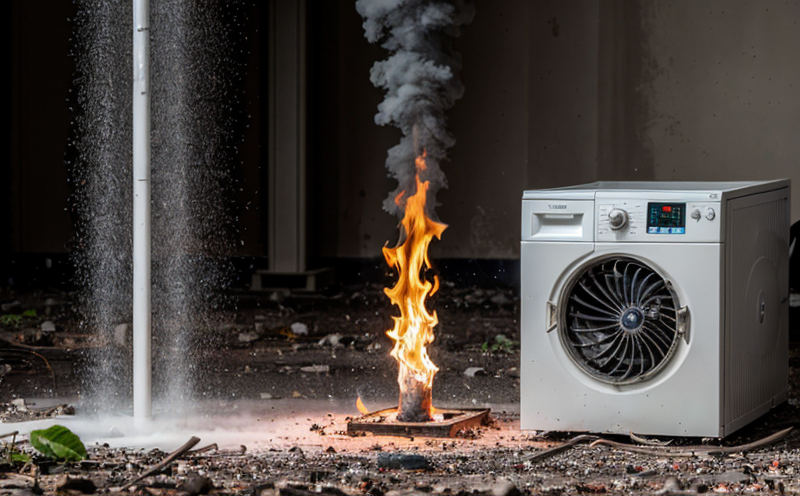JIS C8712 Environmental Stress Testing of Secondary Lithium Cells
The JIS C8712 standard is a critical tool in ensuring the robustness and reliability of secondary lithium cells under extreme environmental conditions. This test evaluates how well these batteries withstand high-pressure, low-temperature, and other harsh environments that they might encounter during use. The objective is to guarantee that battery performance remains consistent across various operational scenarios, thereby enhancing product safety and longevity.
The JIS C8712 standard specifies a series of environmental stress tests designed to simulate the real-world conditions faced by secondary lithium cells in diverse applications such as automotive, aerospace, and consumer electronics. By subjecting batteries to controlled temperature extremes, humidity variations, mechanical shocks, and other stressors, manufacturers can identify potential weaknesses early on.
One of the key aspects of this testing is the ability to predict how well a battery will perform under conditions that could lead to failure or degradation over time. This includes assessing the impact of cold temperatures which can cause internal resistance increases, as well as high pressures which may compromise structural integrity. Additionally, it helps in understanding the effects of humidity levels on electrolyte stability and overall cell health.
Another important feature is the evaluation of batteries' ability to recover from these stresses after exposure. This recovery capability is crucial for determining whether a battery can maintain its performance post-stress testing. The results provide valuable insights into not just initial durability but also long-term reliability, allowing manufacturers to make informed decisions about design improvements and material selections.
Through rigorous adherence to the JIS C8712 protocol, companies ensure that their products meet stringent quality standards set forth by this international standard. This approach fosters trust among consumers who expect safe and dependable performance from their devices or vehicles powered by lithium cells.
In summary, JIS C8712 testing plays a pivotal role in safeguarding the integrity of secondary lithium cells against adverse environmental factors. It contributes significantly to enhancing both product quality and consumer confidence through comprehensive evaluation processes that mimic real-world usage scenarios.
Why It Matters
The significance of JIS C8712 Environmental Stress Testing cannot be overstated, especially in today’s rapidly evolving technological landscape where sustainability and reliability are paramount. By subjecting secondary lithium cells to controlled environmental conditions, this test ensures that the batteries perform consistently across diverse operational scenarios.
- Enhances product safety by identifying potential weaknesses early
- Promotes longer-lasting battery life through improved design choices
- Fosters greater consumer trust in the reliability of products powered by lithium cells
- Supports regulatory compliance and industry best practices
- Aids in optimizing production processes for efficiency and cost-effectiveness
The results from JIS C8712 testing provide manufacturers with actionable data that can be used to enhance battery performance, extend shelf life, and improve overall product quality. This not only benefits the manufacturer but also contributes positively towards environmental sustainability efforts by promoting longer-lasting products.
Moreover, compliance with international standards like JIS C8712 demonstrates a company’s commitment to excellence in manufacturing practices, thereby gaining competitive advantage in an increasingly globalized market.
Why Choose This Test
- Comprehensive Evaluation: JIS C8712 provides a thorough assessment of secondary lithium cells' resilience to various environmental stresses, ensuring consistent performance across different operational conditions.
- Predictive Power: Identifies potential issues early on, allowing manufacturers to make necessary adjustments before product release.
- Regulatory Compliance: Ensures adherence to international standards, which is essential for market access in many countries.
- Consumer Trust: Enhances brand reputation by delivering safer and more reliable products.
- Innovation Opportunities: Encourages continuous improvement in battery technology through rigorous testing protocols.
The JIS C8712 test offers unparalleled insights into how well secondary lithium cells can withstand harsh environmental conditions. This knowledge is invaluable for developers looking to innovate and improve upon existing technologies, ensuring that they meet high standards of quality and reliability.
Competitive Advantage and Market Impact
Adopting JIS C8712 Environmental Stress Testing offers several competitive advantages for companies operating in the battery industry. Firstly, it provides a clear differentiation point from competitors who may not adhere to such stringent testing protocols. This commitment to quality can significantly enhance brand image and customer trust.
Secondly, by ensuring that batteries meet or exceed international standards, organizations position themselves favorably within global markets. As environmental concerns continue to grow, this level of compliance becomes increasingly important for gaining market share.
Thirdly, JIS C8712 testing promotes continuous innovation and improvement in battery technology. The insights gained from these tests allow manufacturers to refine their products iteratively, leading to better-performing batteries that can meet evolving customer needs.
In summary, implementing JIS C8712 Environmental Stress Testing not only strengthens a company’s position within the industry but also contributes positively towards environmental sustainability efforts by promoting longer-lasting products. This aligns with broader global trends toward eco-friendly practices and responsible resource management.





